Excavation Contractors Stockton
Top 10 Excavation Services in Stockton
Receive multiple Excavation Contractors Near Me quotes for your project today! Compare profiles, reviews, accreditations, portfolio, etc... and choose the best service.

Bailey's Trenchless Inc
3.73 reviewsSacramento, US- Services
- Why Us?
Get Quote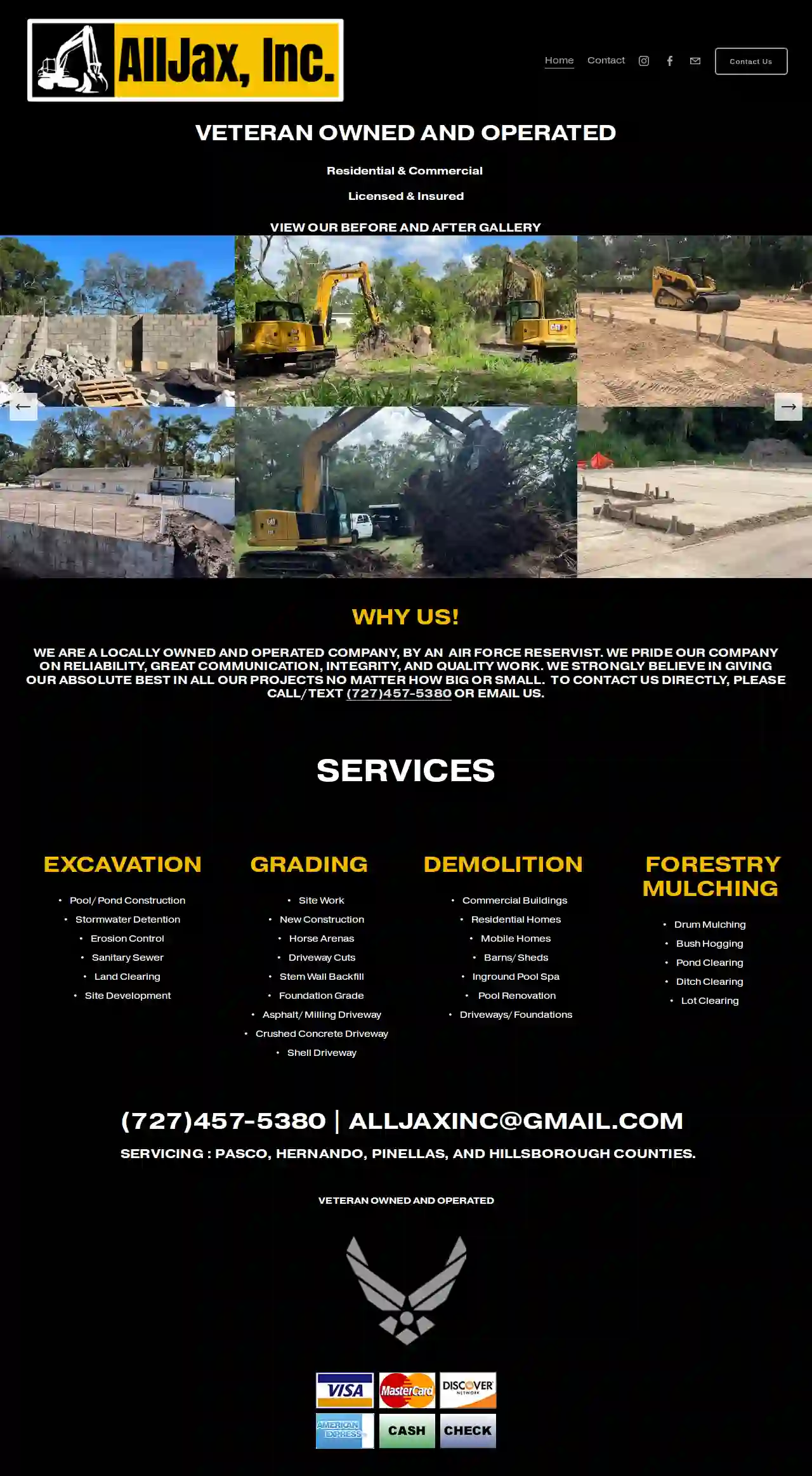
AllJax Inc Excavation, Forestry Mulching & Pond Clearing
4.935 reviewsDavis, USAllJaxInc is a locally owned and operated company, run by an Air Force reservist. We take pride in our reliability, excellent communication, integrity, and high-quality work. We are committed to delivering our best on every project, big or small. We are dedicated to providing exceptional service to our clients in Pasco, Hernando, Pinellas, and Hillsborough Counties. Our team is experienced in a wide range of services, including excavation, pool and pond construction, stormwater detention, erosion control, sanitary sewer, land clearing, site development, forestry, demolition, and grading. We are fully licensed and insured, and we are proud to be a Veteran Owned and Operated business. To contact us directly, please call/text (727)457-5380 or Email Us.
- Services
- Why Us?
- Gallery
Get Quote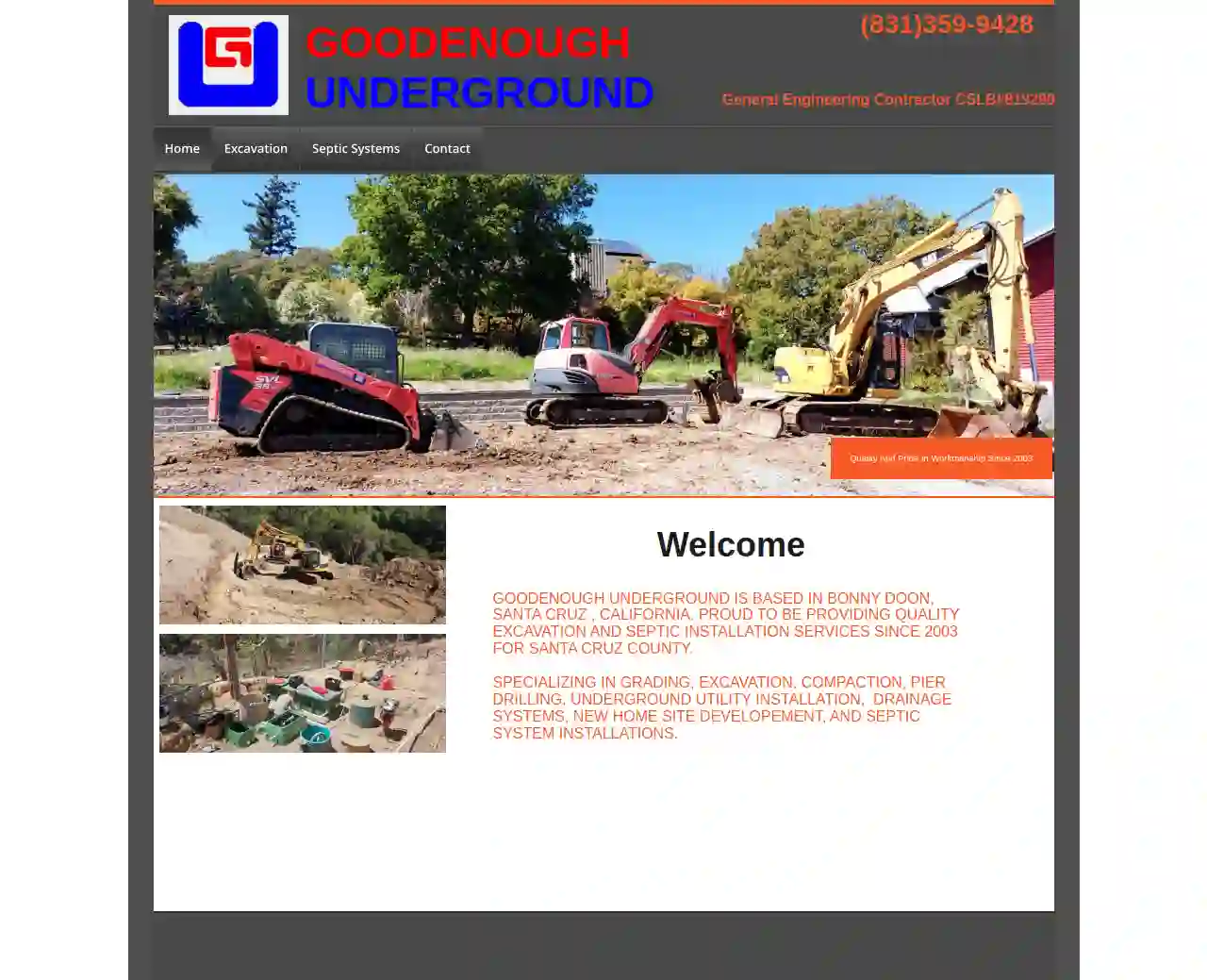
GOODENOUGH UNDERGROUND INC.
57 reviewsBonny Doon, USGOODENOUGH UNDERGROUND IS BASED IN BONNY DOON, SANTA CRUZ , CALIFORNIA. PROUD TO BE PROVIDING QUALITY EXCAVATION AND SEPTIC INSTALLATION SERVICES SINCE 2003 FOR SANTA CRUZ COUNTY. SPECIALIZING IN GRADING, EXCAVATION, COMPACTION, PIER DRILLING, UNDERGROUND UTILITY INSTALLATION, DRAINAGE SYSTEMS, NEW HOME SITE DEVELOPEMENT, AND SEPTIC SYSTEM INSTALLATIONS.
- Services
- Why Us?
- Our Team
- Gallery
Get Quote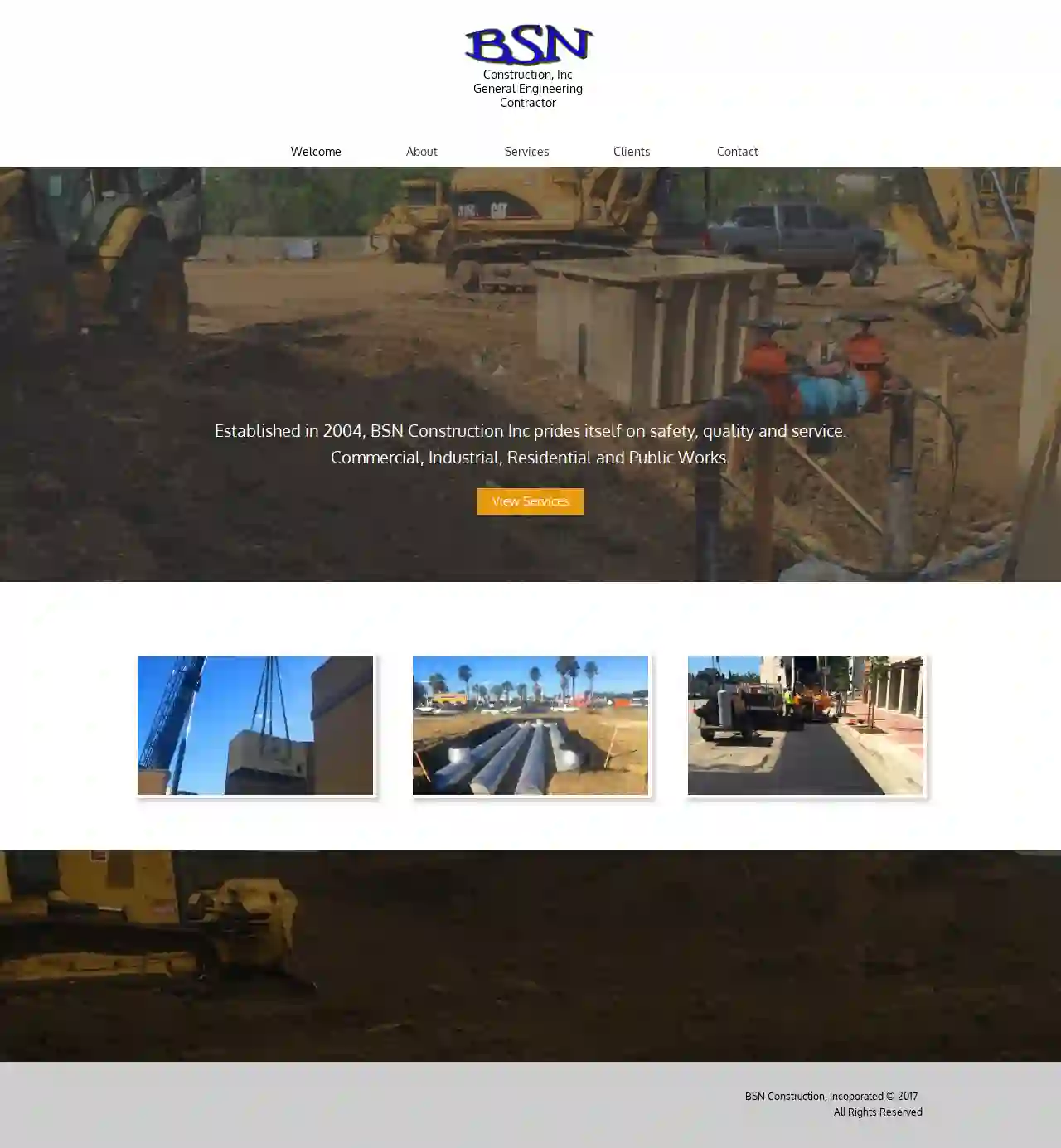
BSN CONSTRUCTION, INC
1Suite 200, 1000 Old Country Rd, Garden City, 11747, USBSN Construction: Your Trusted Partner for Quality Construction BSN Construction is a family-owned and operated business with over 20 years of experience in the construction industry. We are committed to providing our clients with the highest quality construction services at competitive prices. We specialize in a wide range of construction projects, including residential, commercial, and industrial. We are also a licensed and insured contractor, so you can rest assured that your project is in good hands. We understand that building or renovating your home or business is a big decision. That's why we take the time to listen to our clients' needs and work with them to develop a plan that meets their specific requirements. We are also committed to providing excellent customer service and keeping our clients informed throughout the entire construction process. If you are looking for a reliable and experienced construction company, look no further than BSN Construction. We are confident that we can provide you with the quality construction services you need to make your project a success.
- Services
- Why Us?
Get Quote
Double Edge Construction Inc
1Irvine, USProfessional Construction Service At Double Edge Construction Inc., we are your trusted partner for high-quality construction and remodeling services in Orange County and the surrounding areas. Our expertise spans a wide range of services, including bathroom remodeling, kitchen remodeling, deck construction, foundation repair, and new building construction. We also specialize in water heater installation, seismic retrofitting, outdoor structure construction, and more. Our team of experienced professionals is dedicated to delivering top-notch craftsmanship and ensuring your complete satisfaction. Whether you’re looking to remodel your bathroom or kitchen, build a new deck, or undertake a full-scale construction project, we manage every aspect with precision and care. We take pride in our ability to bring your vision to life, from the initial design to the final touches. Double Edge Construction Inc. proudly serves communities throughout Orange County, including Tustin, Santa Ana, Orange, Irvine, Newport Beach, Laguna Beach, Costa Mesa, Anaheim, Fullerton, Mission Viejo, and beyond. Our local knowledge and commitment to excellence make us the ideal choice for homeowners and businesses in these areas. For reliable and professional construction and remodeling services, contact Double Edge Construction Inc. today. Let us help you turn your project into a reality with our seamless, hassle-free approach. Our Services Construction, Installations & Repairs
- Services
- Why Us?
- Testimonials
- Gallery
Get Quote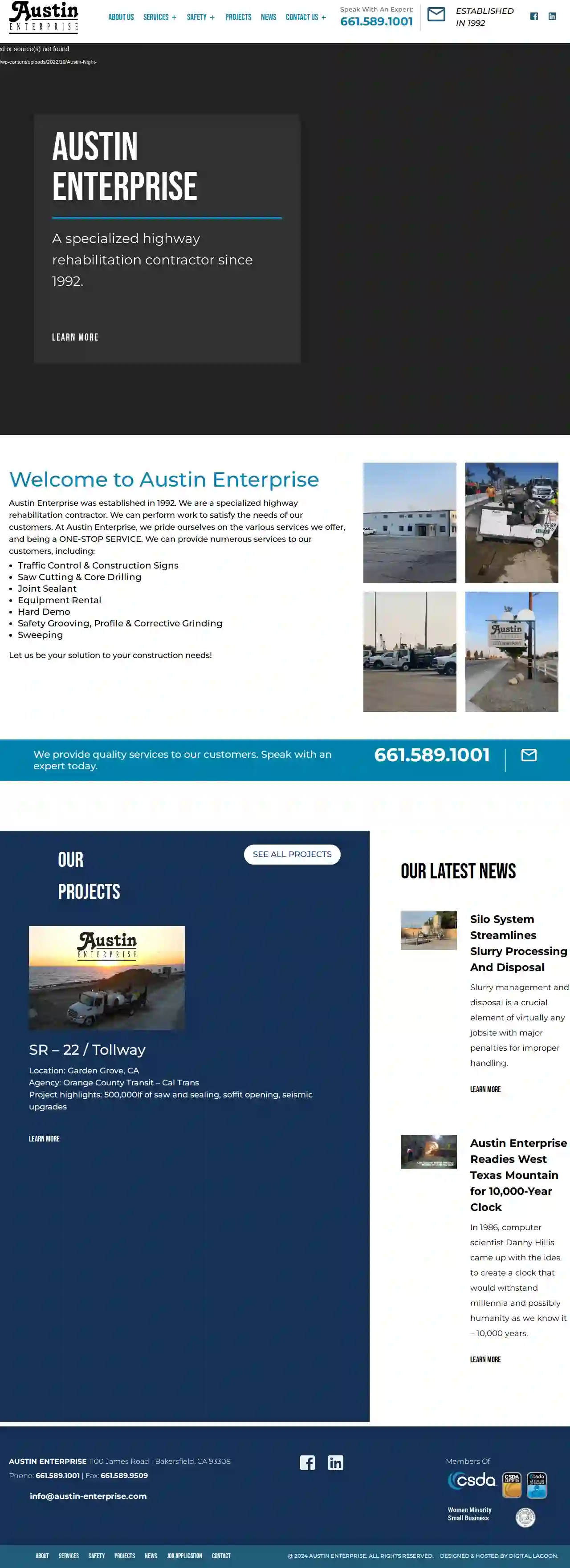
Austin Enterprise
4.116 reviews1100 James Road, Bakersfield, 93308, USAbout Austin Enterprise For almost 30 years, Austin Enterprise has taken pride in having the best equipment and the best people to get any job done well and on-time. We employ 50+ employees and maintain a truck fleet of 40+ vehicles, ensuring that our customers can rest assured that they are getting quality work with the knowledge and experience of our teams to back it up. We’re proud to have been a CSDA member since 2010. Our mission is to be a professional specialty company. We take pride in ourselves, our company, equipment, and fellow employees. We strive to service our customers with quality service, provide well-trained employees, and maintain good working equipment. We aim to be the best in the industry, exceeding expectations and setting the standard for excellence. Patti Austin, the founder of Austin Enterprise, started the company in 1992 in Bakersfield, CA. Initially, Austin Enterprise focused on traffic control, providing highway construction signs. This early work allowed Patti to connect with other contractors working on highway projects. Through this networking, Patti identified opportunities to expand Austin Enterprise and added sawing and drilling to their list of services. Today, thanks to Patti’s dedication and hard work, Austin Enterprise has grown into one of the largest specialized highway rehabilitation contractors in California, with 47 trucks and over 50 employees. Austin Enterprise is a woman-owned business.
- Services
- Why Us?
- Our Team
- Gallery
Get Quote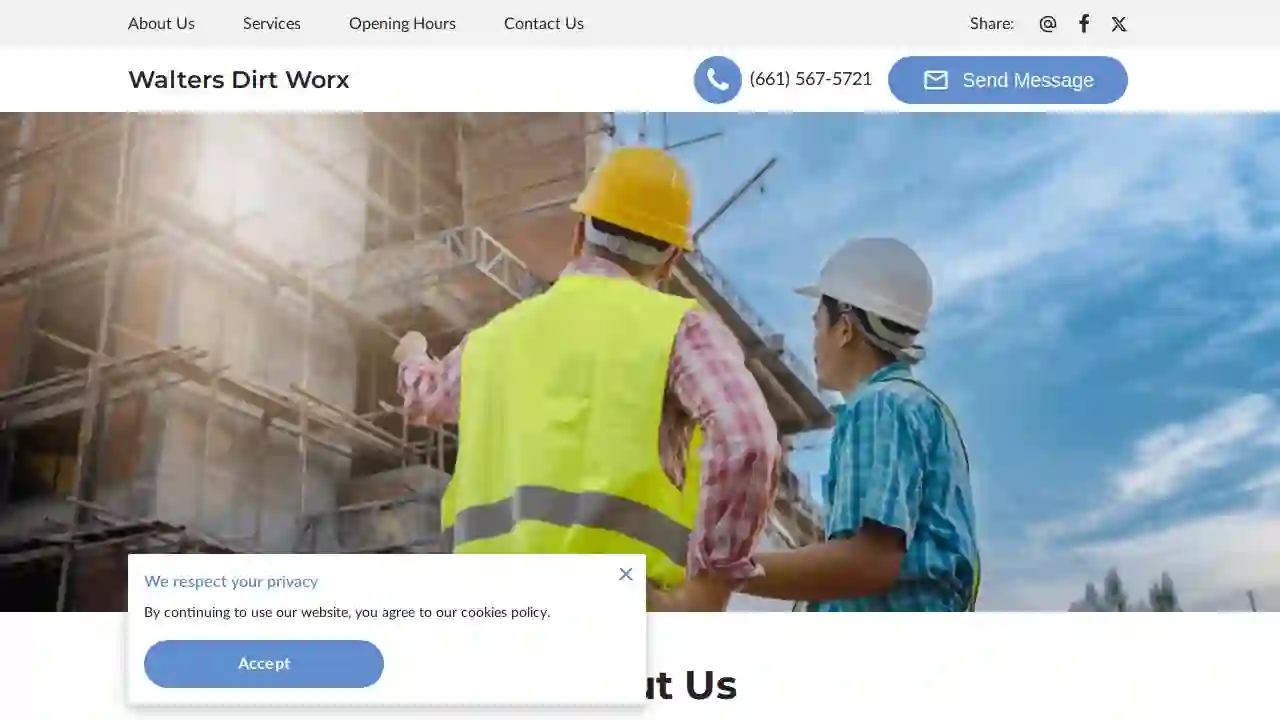
Walters Dirt Worx
1Bakersfield, California, USAbout Us Here at Walters Dirt Worx we offer an exceptional range of construction services in the greater Bakersfield area. From concrete foundation work to excavation, brickwork, and architectural advice, our experienced builders understand the best solutions that work for you. We provide any heavy equipment required work with outstanding results and unbeatable pricing. We’re all dedicated to our roles and work hard to get the job done. Give us a call at +16615675721 so we can discuss any of your construction needs. We always use the highest quality materials during the construction of your outdoor space and our expert designers utilise industry-leading tools. This mix of top equipment and unmatched skill has allowed us to succeed by supplying our clients with services they won’t forget. Not convinced? Think we’re all talk? Read our reviews and get in touch to see what we can deliver. You will not be disappointed. Are you putting together a blueprint for a property or building? If you are, we can deliver expert excavation services to prepare a new build for the foundations and basis of your construction. We understand the demands that are placed on you, so work with your goals in mind to prepare and excavate the land by the most efficient means possible, using a combination of manpower and highly technical heavy-duty vehicles.
- Services
- Why Us?
Get Quote
United Concrete Asphalt & Grading
51 reviewsUnited Concrete Asphalt & Grading, Fayetteville, NC, 28306, USUnited Concrete Asphalt & Grading: Your Trusted Concrete Contractor in Fayetteville, NC Looking for a reliable and experienced concrete contractor in Fayetteville, NC? Look no further than United Concrete Asphalt & Grading. We specialize in providing high-quality concrete and asphalt services for both residential and commercial properties. We understand that your property is an investment, and we're committed to delivering exceptional results that enhance its value and beauty. Our team of skilled professionals has the expertise and equipment to handle all your concrete and asphalt needs, from driveways and sidewalks to parking lots and more. We also offer land clearing and grading services to prepare your property for any project. At United Concrete Asphalt & Grading, we pride ourselves on our commitment to customer satisfaction. We work closely with our clients to understand their needs and ensure that their projects are completed on time and within budget. We also use only the highest quality materials and techniques to ensure that our work is durable and long-lasting. Contact us today for a free estimate and let us help you bring your vision to life!
- Services
- Why Us?
- Testimonials
- Gallery
Get Quote
Bowden Excavating Inc.
518 reviewsOntario, USWelcome to Bowden Excavating Get a Quote Our Services Lanes Whether it’s for your driveway, walkway, or that secret garden you’ve been dreaming of – we’ve got the solution you’re looking for. Read More Ponds From cozy koi ponds to larger-than-life lagoons, we’ve got the expertise to turn your aquatic dreams into reality. Read More Foundations Solid foundations are the bedrock of any structure, from small houses to skyscrapers, and we’re here to lay it down. Read More Southwestern Ontario Excavation Contractors Why us? Simple – we love what we do, and it shows. Our team is a group of excavation enthusiasts who bring passion to every project. We’re not just moving dirt; we’re crafting spaces for dreams to unfold. With us, more than hiring a crew, you’re gaining partners in your excavation adventure. Best Feedback We are one of the top-rated companies in this industry in Ontario Flexible Services We have what you need to get your excavation projects done Fast Response Get boots on the ground fast and ready to get your project moving Specialized Team Highly trained professionals to make sure your job is done with maximum quality Professional Excavating Services Excellence In Excavation See why we’re your one-stop solution for all things excavation. We take pride in offering a diverse range of services, tailored to meet your unique needs. Here’s a quick overview of what we bring to the table:
- Services
- Why Us?
- Gallery
Get Quote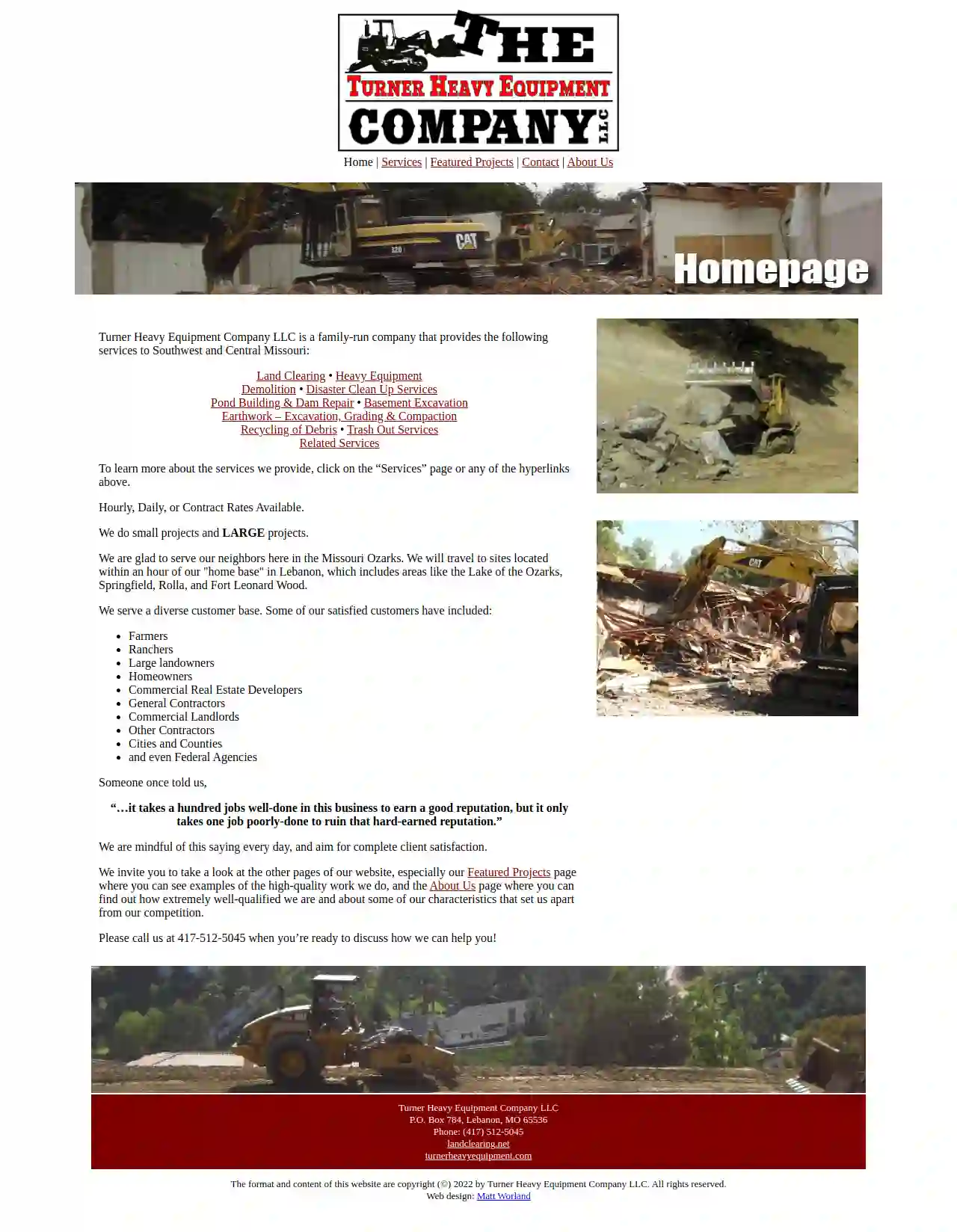
Magnum Land Clearing Inc.
1Santa Clarita, US- Services
- Why Us?
Get Quote
Over 3,943+ Excavation Pros in our network
Our excavation contractors operate in Stockton and surroundings!
ExcavationHQ has curated and vetted the Best Excavation Companies near Stockton. Find the most reliable pro today.
Frequently Asked Questions About Excavation Contractors
- Sloped Property: Your property has a significant slope, making it prone to soil erosion or landslides.
- Creating Usable Space: You want to level off a sloped area to create a flat surface for patios, gardens, or other outdoor spaces.
- Preventing Damage: Erosion is threatening existing structures, driveways, or walkways.
- Landscaping Features: You're incorporating tiered gardens, raised beds, or other landscaping elements requiring soil retention.
- Hauling to Designated Disposal Sites: Transporting excavated material to approved landfills or recycling centers.
- Recycling or Reuse: If suitable, some excavated soil might be recycled for other projects or reused on-site for landscaping or backfilling.
- Complying with Regulations: Adhering to local and environmental regulations for soil disposal to prevent contamination or illegal dumping.
- Excavations Deeper Than a Certain Depth: This varies by jurisdiction, usually around 5 feet.
- Excavations Near Utilities: Digging near buried utilities (gas, water, electric) often requires permits and utility locates to prevent damage.
- Excavations Affecting Public Property: Projects impacting sidewalks, roads, or other public areas typically require permits.
- Excavations in Environmentally Sensitive Areas: Projects in wetlands, floodplains, or other sensitive areas might need special permits.
How do I know if I need a retaining wall?
How do you handle soil disposal after excavation?
Do I need a permit for excavation?
What is the difference between excavation and grading?
Excavation: Primarily involves removing earth or other materials from a site. It's about digging down and creating space.
Grading: Focuses on shaping and leveling the ground to a specific slope or elevation. It's about adjusting the existing terrain.
For example, you might excavate a foundation and then grade the surrounding area to ensure proper drainage and a level surface for landscaping.
How do I know if I need a retaining wall?
- Sloped Property: Your property has a significant slope, making it prone to soil erosion or landslides.
- Creating Usable Space: You want to level off a sloped area to create a flat surface for patios, gardens, or other outdoor spaces.
- Preventing Damage: Erosion is threatening existing structures, driveways, or walkways.
- Landscaping Features: You're incorporating tiered gardens, raised beds, or other landscaping elements requiring soil retention.
How do you handle soil disposal after excavation?
- Hauling to Designated Disposal Sites: Transporting excavated material to approved landfills or recycling centers.
- Recycling or Reuse: If suitable, some excavated soil might be recycled for other projects or reused on-site for landscaping or backfilling.
- Complying with Regulations: Adhering to local and environmental regulations for soil disposal to prevent contamination or illegal dumping.
Do I need a permit for excavation?
- Excavations Deeper Than a Certain Depth: This varies by jurisdiction, usually around 5 feet.
- Excavations Near Utilities: Digging near buried utilities (gas, water, electric) often requires permits and utility locates to prevent damage.
- Excavations Affecting Public Property: Projects impacting sidewalks, roads, or other public areas typically require permits.
- Excavations in Environmentally Sensitive Areas: Projects in wetlands, floodplains, or other sensitive areas might need special permits.
What is the difference between excavation and grading?
Excavation: Primarily involves removing earth or other materials from a site. It's about digging down and creating space.
Grading: Focuses on shaping and leveling the ground to a specific slope or elevation. It's about adjusting the existing terrain.
For example, you might excavate a foundation and then grade the surrounding area to ensure proper drainage and a level surface for landscaping.